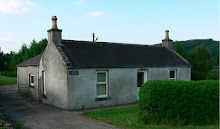 Next week I’m going to Preston to give a lecture, and then spending a coupla nights in Edinburgh, which happens to coincide with the Fringe Festival. I hope to see Ian Hamilton Finlay's Little Sparta (which, according to the Guardian last week is not only Finlay's best work but "Scotland's greatest work of contemporary art"), William McGonagall's grave, and Martha Rosler's library (which I attended in Manhattan a coupla years ago, and really enjoyed).
Next week I’m going to Preston to give a lecture, and then spending a coupla nights in Edinburgh, which happens to coincide with the Fringe Festival. I hope to see Ian Hamilton Finlay's Little Sparta (which, according to the Guardian last week is not only Finlay's best work but "Scotland's greatest work of contemporary art"), William McGonagall's grave, and Martha Rosler's library (which I attended in Manhattan a coupla years ago, and really enjoyed). But I'm most looking forward to seeing Kristin Hersh perform at Cabaret Voltaire, as part of the Edge Festival. Though not mentioned near as often as other musicians on this blog (or the one I wrote for Mercer Union, previously), she is far and away my favorite singer-songwriter. For those not familiar with her work, here's a lil primer:
In 1981, when she was fifteen years old, Hersh formed the band Throwing Muses with her step-sister Tanya Donnelly, in Newport, Rhode Island. They self-released a demo tape known as The Doghouse Cassette which came to the attention of Ivo Watts-Russell, who ran the influential 4AD label (then home to Nick Cave and the Birthday Party, Cocteau Twins, This Mortal Coil, Dead Can Dance, Colin Newman, Bauhaus and Wolfgang Press). He offered to sign the band, who became the first American act on the label. Their eponymous debut was released in 1986, to much critical acclaim. The songs featured unorthodox structures, shifting tempos, and stark, candid lyrics. Hersh's writing, playing and vocals were offset by Donnelly's pop sensibilities and harmonies, and by the unique drumming of David Narcizo (who, at times, looked like he was trying to nail his kit to the floor).
The next year they released both The Fat Skier and the Changes Chained EP (now grouped together on one CD), and House Tornado the year after that. Their first album to crack to the top 100, Hunkpapa, was released in 1988. It had some great songs on it (Devil's Roof, Santa Claus and a near-hit, Dizzy) but was marred by weak production and the unfortunate choice of adding horns and keyboards. This was followed by The Real Ramona and the single Counting Backwards, which came backed with a track called Cottonmouth, which is my favorite b-side of all time.
Prior to this record Donnelly formed The Breeders as a side-project band with Kim Deal (of the Pixies) and released the Steve Albini produced Pod. After The Real Ramona, which featured Donnelly's most popular Muses song (Not Too Soon), she left both bands to form Belly, who went on to considerable (though short-lived) success.
The Muses continued on as a trio, releasing the stripped down Red Heaven, perhaps the group's most consistent effort since their debut. The next record would be the acoustic solo record Hips and Makers and following this Hersh released both Muses records and solo albums and also formed another band, the heavier 50 Foot Wave.
Of the later Throwing Muses records University was both the strongest, and the most popular, spawning a minor alternative hit called Bright Yellow Gun. Hips and Makers and Strange Angels (co-produced with Joe Henry) are the best of the acoustic albums. Sunny Border Blue and the recent Learn to Sing Like A Star are the standout non-acoustic solo recordings.
Hersh also self-released a brilliant record of Appalachian songs called Murder, Misery and Then Goodnight in 1998. A decade later, the follow-up is expected this year. These were songs that her father would sing to her as a child, the type of lullabies and murder ballads found on Harry Smith’s classic Folkways collection.
Hersh has collaborated with Michael Stipe of REM (who sang back-up on Your Ghost), Xiu Xiu, Vic Chesnutt, and Bob Mould. The Throwing Muses are cited as an influence by Radiohead, and both The Flaming Lips and the Pixies used to open for them. They’re just still waiting for the their ‘Fight Club’ moment. Hersh has three records in Pitchfork’s Top 100 of the nineties (two Muses, one solo) and Spin Magazine has included the debut record in their top 100 alternative albums of all time book.
The performance in Edinburgh is called Paradoxical Undressing, named after the phenomenon where hypothermia victims become confused and disoriented, and begin shedding their clothes. The performance will include spoken word, film, music and essays, with Hersh reading excerpts from her forthcoming memoir, detailing her teenage years grappling with mental illness, pregnancy and life in the music business.
Her Myspace page is here. The CASH Music project - Coalition of Artists and Stakeholders (again, presumably influencing Radiohead) website is here. Everything else (including many downloadable songs) can be found at www.kristinhersh.com.

No comments:
Post a Comment